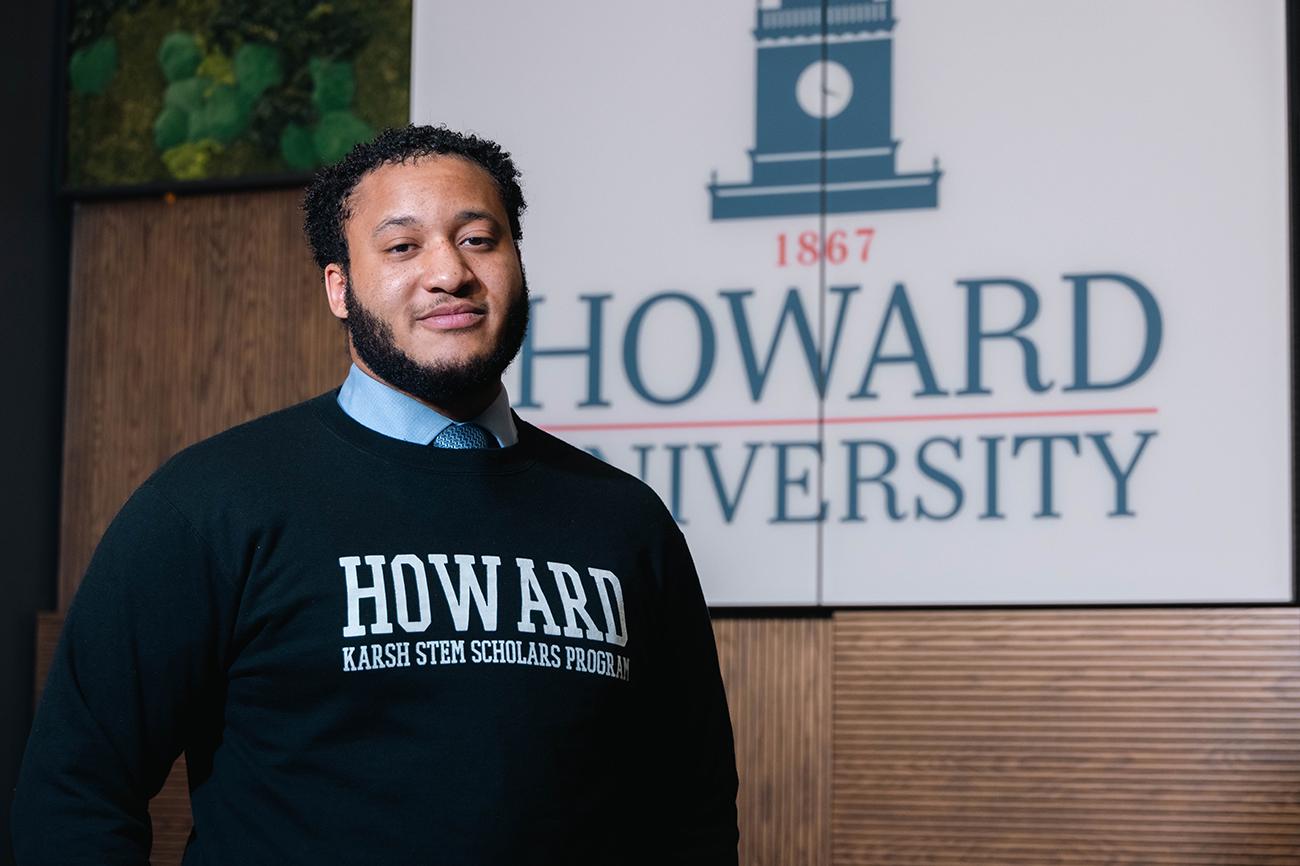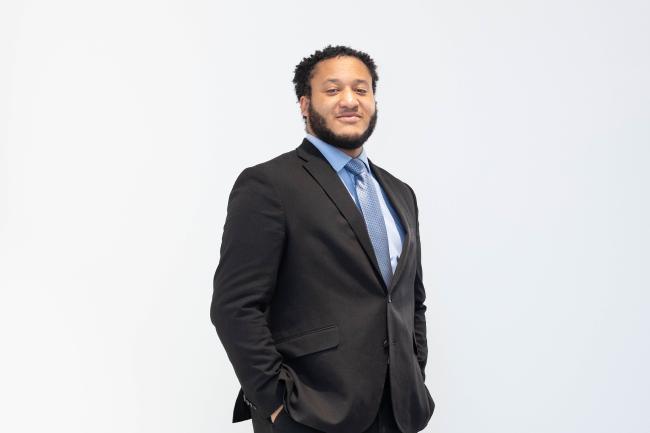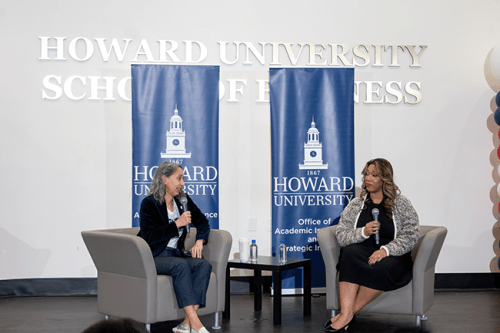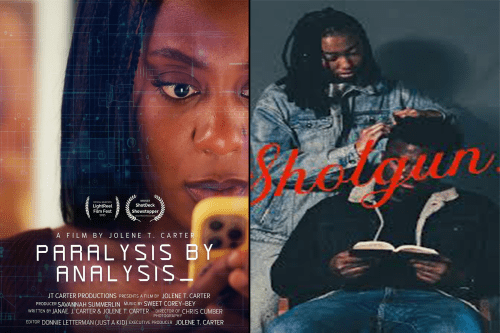Photo by Cameron Hubbard
Howard’s values align directly with those of graduating senior Kaie Hall, a chemical engineering major from Bowie, Maryland. The university’s core tenants of truth and service have manifested in major ways in his life. In particular, he has learned to tell his own truth by advocating for himself and has taken pains to help younger students do the same. In terms of service, he has become a mentor of sorts to younger students, helping them to make the contacts they will need to effectively move forward in their college and career journeys. He has also devoted himself to working with programs like Alternative Spring Break, Howard’s nationwide student service program. Hall helped to organize the student-run initiative and spent his own senior year spring break volunteering in Tampa.
Perhaps the most demonstrable example of Hall’s commitment to truth and service is the seriousness with which he has approached scientific research. He has conducted research around the country and presented at the Annual Biomedical Research Conference for Minoritized Students (ABRCMS).
“I just love the idea of how everything is made up of atoms and molecules, and you can just keep building from there to create new discoveries,” he said. “One thing I really like about science is how it explains how things work.”

As an intern in Howard’s Thompson Lab, Hall has heavily researched the genetic engineering of harmful bacteria. The ramifications could be nothing short of revolutionary in the treatment of human illness and disease. Instead of treating a bacterial infection by bluntly trying to kill the bacteria, Hall and his faculty mentors are looking at how to prevent the bacteria from protecting itself against human immunological defenses.
“Basically, what I do here is I study bacteria, and I do some engineering to understand the basic genetics of how they work, especially as it pertains to infections and virulence, how bacteria can get in your body, and how we can combat their ability to survive in your body,” he said.
Bacteria thrive when the human body is within normal temperature levels. When harmful bacteria are present in the human body, the body will often try to kill the bacteria through heat, which is why you get a fever when you are sick. The bacteria, in turn, produce “heat shock proteins,” which help them withstand the effect of your body’s elevated temperature. Hall has been studying how to prevent the bacteria from manufacturing the heat shock proteins and thus reduce their ability to survive inside the body.
Part of Hall’s research has involved the use of plasmids, which are DNA molecules that replicate inside of the bacteria. Hall has synthetically created about twenty plasmids with special genetic coding and placed them inside of bacterial cells to observe how they change the way the bacteria function. In particular, he is exploring how the plasmids might hinder the ability of bacteria to produce the heat shock proteins and allow the human body to kill harmful bacteria with less effort.
“Bacteria have become equipped to become superbugs and resist all kinds of antibiotics, so we have to change our thinking of how we are going to get rid of the bacteria or make it easier for our bodies to take care of the bacteria.”
Hall has also worked with staphylococcus aureus, the bacteria responsible for staph infections that impact the skin, blood, bone, joints, and heart. Staph infections can lead to pneumonia and even life-threatening situations. It is transmitted through direct contact with an infected person, inhaling droplets from the person’s sneeze or cough, or touching a contaminated object.
He is examining how some micro RNAs in a cell prevent other RNAs from creating proteins critical to a cell’s survival. For example, a protein present in staphylococcus aureus can help to regorge antibiotics. When the staph infection is treated by using antibiotics to disrupt the bacteria cells, the bacteria can simply pump the antibiotics right back out and continue to survive. Hall is trying to find RNA that can be injected into the bacterial cell and prevent its survival proteins from ever being created in the first place, allowing the cell to be killed more efficiently.
“Bacteria have become equipped to become superbugs and resist all kinds of antibiotics, so we have to change our thinking of how we are going to get rid of the bacteria or make it easier for our bodies to take care of the bacteria,” said Hall.
Outside of Howard, Hall has engaged in neuroscience research at Johns Hopkins University and Washington University in St. Louis.
At the Dawson Lab, part of Johns Hopkins Medical Institute, Hall examined the causes of Parkinson’s disease. When a person has Parkinson’s disease, there is a widespread death of the nervous system’s dopamine neurons, he learned. These are largely responsible for sending motor signals from the brain to the muscles, which is why Parkinsons patients often have difficulty with movement.
Kinases are enzymes that add chemicals to molecules in a cell. Hall looked at the kinases which emerged after the first indications of damage within the nucleus of the dying neurons associated with Parkinson’s. He wanted to know which kinases were adding chemicals that helped the body mitigate damage to the neurons, and which ones had the opposite effect, actually speeding up the damage. He used a highly specialized confocal microscope to examine more than 30 kinases and found one which appeared to be directly related to damage to the neuron.
In the Miller Lab at Washington University in St. Louis, he tackled amyotrophic lateral sclerosis, also known as ALS, a nervous system disorder that causes loss of muscle control. He shadowed Dr. Tim Miller, one of the nation’s foremost researchers into neurodegenerative diseases. As part of his research, Hall looked at the kinases in brain cells that are responsible for a kind of waste disposal function called autophagy, through which motor neurons eliminate damaged organelles (internal cell structures) and mutated or misfolded proteins that cannot perform their functions appropriately. When these kinases aren’t present, the cells build up the harmful organelles and proteins which cause neurological damage.
Hall and fellow researchers found RNA that prevented the autophagy-inducing kinase from being present, and then looked at how to introduce other RNA that would prevent the harmful RNA from being effective or stop it from being produced altogether. Ultimately, this type of research may be used to help treat ALS and other neurodegenerative diseases.
“I really think that the community we have here, the staff, the students, the environment we have is just unmatched."
Hall is a member of the Karsh STEM Scholar Program, a Howard program committed to increasing the number of underrepresented minorities who earn a Ph.D. or M.D./Ph.D. in STEM-related disciplines. In addition to financial support, Karsh STEM scholars participate in a summer bridge program, receive professional mentoring, and engage in research internships around the world. Hall is a testament to the program’s success. He has been accepted into the M.D./Ph.D. program at Washington University in St. Louis, where he plans to attend after his Howard graduation. He wants to explore how biology and chemistry interact at the atomic level and explore new ways to look at cell behavior. The mystery of the unknown intrigues him.
“That’s what I think is so interesting about science,” he said. “The more you get into it, the more you realize we don’t know the answers to so much.”

For Hall, however, life can’t be lived simply by looking through a microscope. He has been increasingly determined to take full advantage of the university’s community environment and all that it has to offer. He has helped expose both fellow college and younger high school students to scientific research. In addition to serving on the Alternative Spring Break team, he is part of H.U. Thrive, a student organization focused on student wellness, including mental health. He also loves to dance. He is part of Rumba De Valle Howard’s Chango Latin Dance Team and has performed all around campus and around the city. He is also part of the Caribbean Student Association, American Institute of Chemical Engineers and Engineers Without Borders.
“I really think that the community we have here, the staff, the students, the environment we have is just unmatched,” he said. “It’s exactly what brought me here and its exactly what I’m going to miss.”





